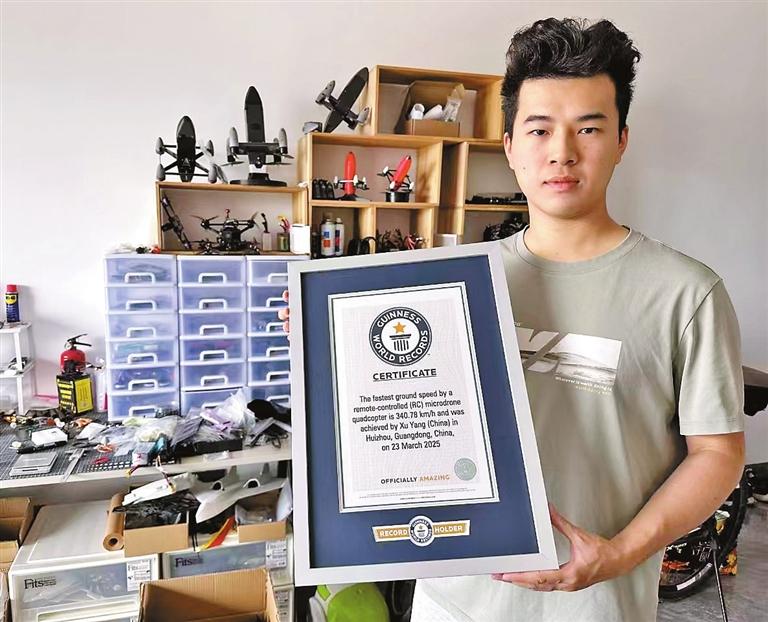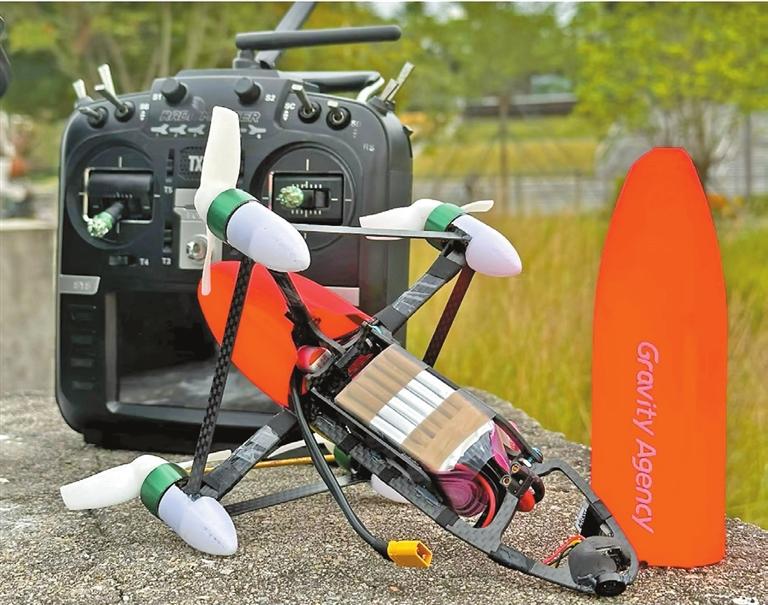


RECENTLY, a student from the Chinese University of Hong Kong, Shenzhen (CUHK-SZ), smashed a Guinness World Record with his self-designed and manufactured drone. The drone, named Prowess and piloted by Xu Yang, a model aircraft enthusiast, reached a top speed of 340.78 km/h, surpassing previous records for remote-controlled microdrone quadcopters. The record-setting flight took place March 23 in Shenzhen’s neighboring city of Huizhou. Weighing under 250 grams — the limit for the microdrone category — the aircraft surpassed a speed barrier that had remained unbroken for three years, marking a significant milestone in microdrone design. Xu explained that the breakthrough was made possible by his drone’s extremely lightweight design and optimized propulsion system, after countless meticulous iterative experiments. Xu was inspired by a 2022 microdrone concept developed by overseas aircraft builder Quadmovr, whose prototype achieved an unofficial speed of 219 km/h that year. In October 2024, Xu’s test flight reached 244 km/h. Following input from international drone builders, Xu further refined his drone’s design and performance, ultimately achieving the record. The accomplishment highlights rapid advancements in lightweight, high-speed drone technology, according to Chinese media reports. Pushing drone boundaries The drone incorporates a lightweight carbon fiber frame and an ultrathin 0.4 mm 3D-printed shell. Xu also designed 3D-printed high-speed propellers to meet the unique performance demands, as no suitable commercial options were available. The custom-made, resin-printed propeller — optimized through five iterations — boosts speed by 10% while reducing power consumption. Fine-tuned details, such as hand-polished aerodynamics and carefully chosen gap-sealing clay, further maximize efficiency. Before the official flight, Xu heated the drone’s battery to around 40°C to ensure maximum performance during the speed trial. His efforts paid off when the Prowess drone reached a top speed of 340.78 km/h, surpassing a long-standing barrier in microdrone design. Cooperation over competition Swiss engineer Samuele Gobbi, the Guinness World Record holder for the fastest remote-controlled quadcopter in the non-micro category, recognized Xu’s achievement as groundbreaking. According to CUHK-SZ’s website, Gobbi had previously received a specialized speed calculation method from the former record holder and later passed it on to Xu. This method was instrumental in analyzing flight data and verifying the record. Xu emphasized that the drone speed racing community values cooperation over competition, expressing his willingness to share his knowledge with future challengers. His journey to the record was not without setbacks — one of his prototypes crashed during a test in November due to motor overload. Despite the challenges, Xu remains committed to pushing the limits of drone performance. He plans to refine the motor and propeller design to achieve even greater speeds. A nurturing environment Born in Jiangmen, Guangdong Province, and growing up in Shenzhen, Xu has harbored a passion for science and tech subjects since childhood, nurtured by his parents and teachers at local schools. The young maker also confirmed the significant role Shenzhen’s supply chains have played in his achievement. “With most suppliers either having factories or stores here, many urgently needed parts can be delivered within a day after I placed an order, which largely sped up my R&D process,” Xu mentioned. Shenzhen has a mature drone industry with leading firms like DJI based in the city. It is home to over 1,700 drone-related companies. The cost for each of his drones ranged from 1,500 to 2,000 yuan (US$210-280), paid by his parents, and some parts were provided free of charge by supportive domestic companies. So far, nine drone companies from across the country have reached out to Xu, some offering 3D printer kits, some providing custom-made motors for free, and others expressing willingness to sponsor any equipment he needs. “We are so happy and proud of the kid,” said Wang Zhenyuan, vice general manager of a local company that supplied the batteries for Prowess. (SD News) | 
